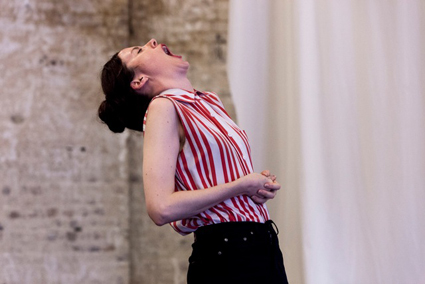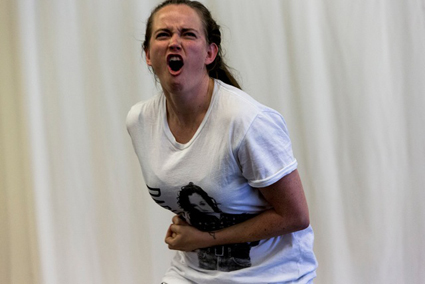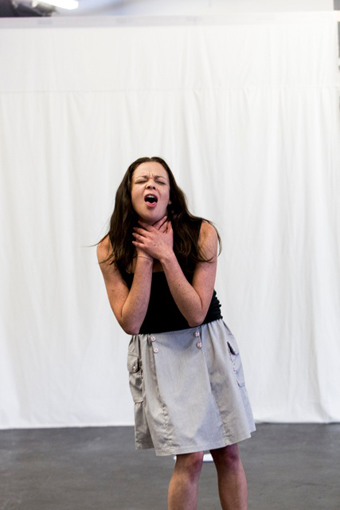 |
Mish Grigor, post, rehearsals for Oedipus Schmoedipus photo Brett Boardman |
This is not a new conversation but it seems timely to focus on it anew, give space to a range of voices, engage with the public debate about how women perform in leadership positions and ask whether the battle for equality of opportunity and remuneration has been won and what these performance makers are thinking about as they negotiate their lives.
Post is Zoë Coombs Marr, Mish Grigor and Natalie Rose. The last show of theirs I saw was Everything I know about the Global Financial Crisis in an Hour (commissioned by version 1.0 at Belvoir Theatre, 2010; RT101). Under the guise of sharing information (there was so much explaining going on at the time in the media) post performed an elaborate conversation about the GFC, full of surmise and free association and the terms being bandied around. That makes it sound serious but it was more like watching jazz or rap complete with obligatory dance breakouts. The performance culminated in champagne corks popping; the ironic party to end all parties. We were going down with a bang. Witty, irreverent and subversive, I heard all the casual and not so casual conversations being had across the country as people wrestled with this big idea. Post positioned themselves as part of this cultural phenomenon. I came to understand something about how we deal with reported crises; the inadequacy of understanding them through our own frames of reference but also the kind of glorious, determined, playful and energetic nature of our sorting through such things with others.
 |
Zoë Coombs Marr, post, rehearsals for Oedipus Schmoedipus photo Brett Boardman |
Sydney Festival: Oedipus Schmoedipus
At the moment of writing, post are working with Anne Louise Sarks (see Women+Performance 2, RT116) on Oedipus Schmoedipus, a Belvoir production for the Sydney Festival (development also supported by Performance Space and Bundanon). This work is another engagement with ‘the canon.’ Belvoir has become home to artists interested in such engagement, its 2014 program reflecting this. Whereas Sarks spoke about this as an engagement with the representation of female characters, post finally always present their own interests, thinking and moves as the primary subject of performance. The canon in their case becomes a subject to wrestle and play with.
“We’ve taken every death scene and mention of death from 2000 years of the western theatrical canon and are attempting to create an incredible spectacular. We wondered if maybe these ‘immortals’ could teach us something about shrugging off this mortal coil. There is so much death in the canon: speculation, musings, mourning, ghosts. We’re interested in death because it truly is universal—we’re all hurtling towards the afterlife, and nobody knows for sure what’s coming…unless Anne Rice was right.
“It’s been very apparent to us in the process of making Oedipus Schmoedipus that women writers are largely missing from the canon, and that many female characters are always fainting dead away, or are infantilised, unless they fall into the women-as-heartless-crazy-bitch category. So we aren’t seeing much of ourselves in there, which is confronting in a way.”
Starting out
Another feature of the story of the women I’ve interviewed has been how study and training has brought them into creative relationships that have been crucial in their starting to make work, and that in many cases these relationships have been sustained through time.
“We met at PACT in Sydney when there were a lot of programs to support emerging artists to train with professional contemporary performance makers, there and at Urban Theatre Projects and Performance Space. We encountered a lot of methodologies and processes and ideas. Some we learnt a lot from, some we disagreed with, others we didn’t understand. In the end we just dove in and made up our own. Our first works (Gifted & Talented, 2007; RT80) were presented at PACT and Next Wave, and then we did a couple of Fringe Festivals before starting to present bigger shows (Shamelessly Glitzy Work, 2009; RT93) at Performance Space, Brisbane Powerhouse, Arts House. In the last couple of years we have started to move into more traditional theatre spaces like STC (Who’s the Best?, 2011; RT104) and Belvoir. Maybe next year we’ll make a 3D movie.”
 |
Natalie Rose, post, rehearsals for Oedipus Schmoedipus photo Brett Boardman |
Networks of support
I have also been intrigued by what communities/support networks these women identify as belonging to and how this informs the work they make. It is clear that the way in which the performance community is configured in different cities and states is unique and changing and that the boundaries that once separated makers because of where they presented or what was seen to be the focus of their work, are disappearing or shifting.
“Our goal has always been to make work that contributes to contemporary performance communities and that is also entertaining and not alienating for our parents. We’re also working in collaboration with the people of Bidwill in Western Sydney to make a rock opera about a fictional riot that was reported there in the early 80s. It’s part of FUNPARK, directed by Karen Therese. We can’t say too much about this yet, but so far a highlight has been jamming with the Rooty Hill Senior Citizens drum and dance group—they have some pretty spectacular moves.
“The thing that excites us the most is working between and across genres, playing with context and convention. Once we know what we’re dealing with, it’s time to change things; there’s nothing more boring than being comfortable. We borrow from a lot of places—visual arts, comedy, drag, live art, reality television, dance, Japanese game shows. Someone came up with the term ‘genre-queer’ recently, which may be very daggy, but we quite like it.”
Collaboration vs the star system
The other emphasis for me in this series so far has been on the central role of collaboration for women and how this sits awkwardly with a market system that requires commodification of the artist, the creation of ‘stars.’
“We work collaboratively, making all decisions together. It means we talk a lot and occasionally end up fighting over a sentence or the colour of a curtain for three or four days. We used to do everything ourselves, but we’re starting to work with a growing family of collaborators. Post is still the three of us, but now we have honorary members—like Logan in The Babysitters Club. We tend to spend a lot of time researching each set of projects that we undertake, and spend a couple of years around a certain set of ideas with a series of outcomes. We often use long-form improvisations to come up with material, but really our process is different with every project. This was pretty bewildering and terrifying for a while, but we’ve come to terms with it now.
“Many of the theatre companies we consider peers and friends are women who work collaboratively. It feels as though the structure that has dominated the last 100 years of theatre-making (visionary director at the apex of power) doesn’t necessarily lend itself to everyone’s processes. And the fact that many of the major companies are built around these traditional structures means that it makes sense they are dominated by men—the system was made by men, for men. It’s a bespoke suit, not a one size fits all snuggie.
“A lot of the time we’re just not interested in those structures. We have our brain in other worlds, other ways of working. At other times we are really engaged with that system, and those traditional hierarchies. We wonder if a massive theatrical revolution could take place. Violence, shoot-outs, sit-ins—all of it. And there should be champagne—it would be a joyous revolution. And dancing. And probably a jumping castle.”
2014 Sydney Festival: Belvoir, post, Oedipus Schmoedipus, Belvoir Upstairs, 9 Jan-2 Feb
Join post. Fed up with white men staging the deaths of white men in plays written by white men? The white ladies from post have pirated the theatrical canon and turned over the juiciest stuff to 700—that’s right, 700 collaborators. Death: it belongs to everyone!
Want to be involved? Oedipus Schmoedipus will be looking for lots and lots and lots of volunteers—no skill level whatsoever required! Email [email protected] to register your interest. See also www.postpresentspost.com/
RealTime issue #118 Dec-Jan 2013 pg. 16
© Anne Thompson; for permission to reproduce apply to [email protected]








 back
back